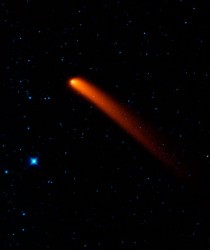Universe today- 3/22/10,

Comets are hardly ever seen by the unaided eye so whenever such a rare occurrence takes place, people viewing one up in the sky are often prompted to ask, “What is a comet?”
A comet is a small, irregularly- shaped, icy body that circles the Sun in long, elliptical orbits, which come very close to the Sun, and then go back deep into space, sometimes way past Pluto’s orbit. A comet is made up of a solid nucleus or core, enclosed in a cloudy atmosphere called coma. Together, the two compose a comet’s head, while one or two tails develop as the comet draws nearer to the Sun.
Read more at Universetoday.com


Comments
Pure non-science to me
Then continue believing dirty ice is a comets makeup and gravity is it's enegy source. For those who want a more substanative theory and willing to ignore mainstream science position regarding our electric universe you can keep reading.
We have lived in a brainwashed world forced to look and think in one direction, both Newton and Einstein were wrong with their overall assumptions, while people like Birkeland, Walter Russell, Nikola Tesla, all knew we lived in an Electric Universe, one of charged particles & bodies. From the very provable electric universe position,a comet once thought an icy snowball changes to something like this;
Electric Universe advocates see them differently.
Comets spend most of their time far from the Sun where the charge density is low. Since comets move slowly, their electric charges reach equilibrium with the weak, radial solar electric field. When a comet falls in to the inner Solar System closer to the Sun, however, its nucleus accelerates into regions of increasing charge density and voltage.
Charge polarization in the nucleus respond to the increasing electrical stress, forming a vast coma (plasma sheath) around the comet. Discharge jets flare up and move across the surface, similar to the plumes on Jupiter’s moon, Io. If the internal electrical stress becomes too great, the nucleus may explode like an overcharged capacitor, breaking into fragments or vanishing forever. Similar effects are most likely responsible for meteoric explosions in Earth’s atmosphere, such as the one that occurred over Tunguska in Siberia.
http://www.thunderbolts.info/wp/2013/01/31/comets-and-galaxies/
Walter Russells book: A New Concept of the Universe, is a book that should be required reading in schools.